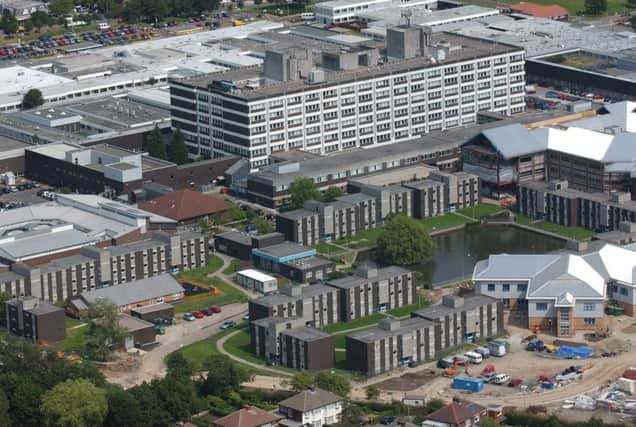'˜Future deaths will occur unless action is taken' - coroner's warning to hospital


Michael Newell, 70, a keen gardener and stalwart supporter of Chipping Show, died at the hospital in 2014.
After an inquest revealed “multiple missed opportunities” by both doctors and nurses to boost his chances of survival, coroner Dr James Adeley has written to the hospital trust to express his concerns.
Advertisement
Hide AdAdvertisement
Hide AdHe warned Lancashire Teaching Hospitals Trust that: “In my opinion there is a risk that future deaths will occur unless action is taken.”
Lancashire Teaching Hospitals NHS Foundation Trust has since put an action plan in place, and said sorry to Mr Newell’s family for their distress.
The 70-year-old businessman was taken to A&E by ambulance after falling into a coffee table at his Chipping home in the early hours of May 4, 2014 after an evening drinking in front of the TV.
His wife Marie told the inquest she tried to stop heavy bleeding from his nose, which left their lounge, kitchen, and bathroom ‘looking like a crime scene’, after being woken by her husband, and called for an ambulance after she was unable to do so.
Advertisement
Hide AdAdvertisement
Hide AdA scan at Royal Preston revealed several facial fractures, while blood tests revealed ‘a level of liver impairment and prolonged blood clotting due to alcohol use’, coroner Dr James Adeley said in his summing up.
He said tests and expert opinion indicated Mr Newell’s “chances of survival on admission were a lot less than 50 per cent”.
But he said ‘no consideration’ was given by A&E staff, neurosurgeons, or ear, nose, and throat surgeons about the impact the damaged liver would have on his treatment before another doctor stepped in.
He said in his letter to the hospital that junior doctors showed a “startling lack of knowledge” of the early signs of life-threatening condition hypovolaemia.
Advertisement
Hide AdAdvertisement
Hide AdAnd it was only after the grandfather-of-three collapsed – leaving him ‘slumped’ in his bed with blood coming from his nose – that medics realised his blood results indicated serious liver disease and may have a substantial bearing on his treatment, Dr Adeley said.
Dr Thomas Thorp, medical registrar, assessed him as having “quite severe decompensated alcoholic liver disease”.
He wrote a plan that included giving Mr Newell blood and an assortment of medications, but nurses didn’t administer some of the drugs until he collapsed a second time.
Dr Adeley said: “There is no adequate explanation given orally by any of the witnesses or documented in the records as to why none of these steps were taken, and in my view this is an example of extremely poor nursing care.”
Advertisement
Hide AdAdvertisement
Hide AdMr Newell died from blood loss following a third collapse at 5.37pm.
Dr Adeley said: “My views on this case are that is demonstrates a far from satisfactory history of medical treatment.
“There was a complete failure by any of the clinicians involved in Mr Newell’s care, prior to Dr Thorp’s involvement, to consider the substantial impact the liver disease may have upon the treatment options to be deployed, and at no time was any specialist input sought by either the neurosurgeons or ENT teams looking after Mr Newell.
“This lack of appreciate for the significance of underlying cirrhosis, and the lack of specialist input, in my view creates a significant risk for other patients using the hospital.”
Advertisement
Hide AdAdvertisement
Hide AdIn his letter to the hospital, Dr Adeley also said there was a ‘worrying lack’ by ENT surgeons to realise the complexity of Mr Newell’s condition, with no senior doctor having an input into his care before his death.
He added: “The nursing care Mr Newell received from 8am onwards on May 5, 2014, displayed evidence [of] inadequate administration of prescribed fluids, inadequate administration of prescribed drugs, inadequate monitoring, and inadequate documentation by a senior nurse of her involvement in the resuscitation, and by other nurses in the care provided, and in the fluid balance charts.”
Recording a narrative verdict, he added: “Whilst Mr Newell’s chances of survival were on the balance of probabilities less than 50 per cent on admission, the medical care by both doctors and nurses missed multiple opportunities to improve any chance Mr Newell had of survival with timely and appropriate treatment, and in my view that lack of adequate resuscitation accelerated his death.
“As I said at the outset, my sympathies remain with the family for their loss, and also for the protracted nature of this inquest, which can have done little to assist their grief.”
Advertisement
Hide AdAdvertisement
Hide AdLancashire Teaching Hospitals NHS Foundation Trust medical director Mark Pugh said: “Firstly, we wish to sincerely apologise for the distress that has been caused to the family of Mr Newell.
“We are committed to providing excellent care with compassion for all of our patients and we regret that we did not achieve that on this occasion.
“An investigation has been carried out and a detailed action plan has been produced and shared with the coroner.
“The coroner is satisfied with our plan and it is currently being implemented.”